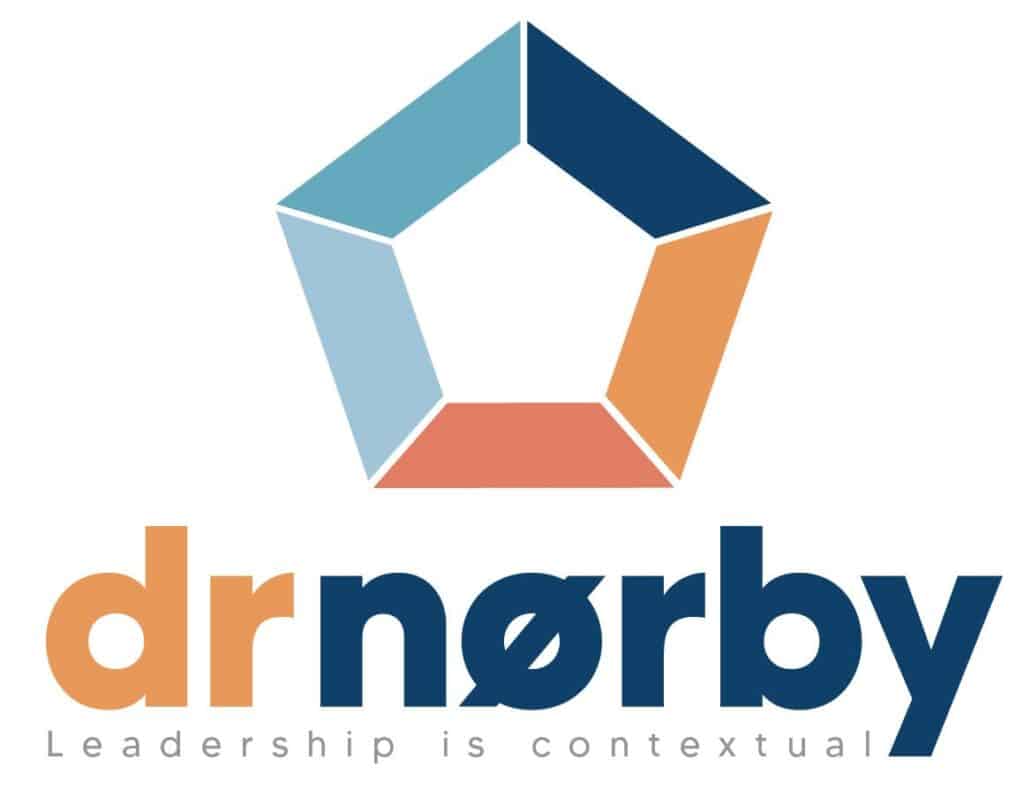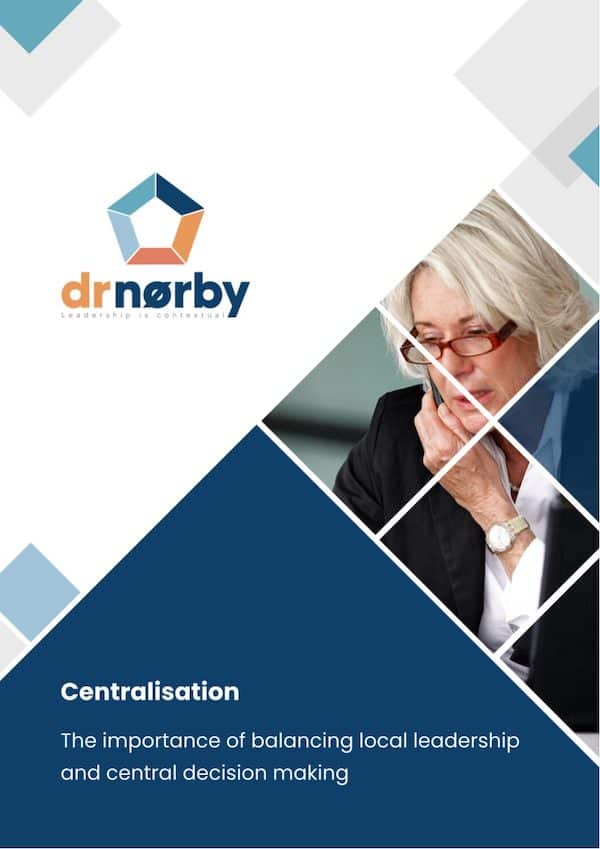Centralisation is linked to organisational design and the related structures within the leadership context that influence leadership and work performance. It’s crucial that leaders understand how to shape and influence those structures to promote performance.
In essence, centralisation is all about the distribution of decision rights within an organisation – or the governance that underpins the organisational structure and who can decide on what and when. It can be characterised as the varying set of task mandates and the more stable mandates regulated in job and role descriptions.
Leaders should use deliberate, tailored levels of centralisation to promote organisational intentions and empower action within their teams.

Why is centralisation important in the leadership context?
In my analysis, I found that centralisation is one of the key factors that influence the emergence of innovation. In general, the higher the level of centralisation, the less creativity seems to emerge:
- Centralised decision-making is mainly conducive to optimising existing business operations – reducing costs and increasing efficiency in running operations.
- Decentralised, or local, decision-making promotes innovation and ownership – bringing new business opportunities to fruition and finding new paths to create new value.
It is important to strike the optimal balance between the two:
- Centralised mandates and decisions can ensure alignment, fast decisions in ambiguous and complex situations, maintain control and ensure coordination and prioritisation. In some cases, organisations can reach very complex decisions more quickly through centralised decision-making rather than at the frontline. Say, for a manufacturer with multiple plants, any issues relevant to all can be best sorted within the central function because local decisions would be made without insight into the experiences and challenges across the other plants.
- Delegating authority to solve problems can also result in more rapid responses, as long as the relevant local expertise and sufficient insight into the consequences of decisions are in place. Sharing leadership by delegating decision-making authority means empowering action by the people close to the real-life insight who are qualified with high levels of competencies. In essence, the leader must know how to strike the optimal balance securing qualified decision-making and organisational agility.

Delegation of decision-making authority can bring people together
- While striking the right balance between centralisation and decentralisation is the key, it seems that higher levels of decentralisation generally lead to higher performance. In one meta-study that I analysed, high-performing workplaces were characterised by decentralisation, i.e. high levels of delegation of decision-making authority. This results in more flexible and rapid responses to changing demands. Such decentralised organisations rely more on decisions governed by expertise than a hierarchy of authority.
- The positive performance impact is further supported since decentralisation also leads to job enrichment. It is motivating to be empowered. Along with high competencies, it allows for high-quality decisions close to the problem owners and quicker response mechanisms. Decentralisation also seems to drive more learning as employees have the discretion to experiment or change ways of working. It is also related to more initiative with less need for (delaying) approval from the leader, leading to higher productivity. Basically, a higher amount of control and discretion in the group positively influences its work effort, intra-group cooperation; helping behaviour; communication; and commitment and satisfaction.
Hence, decentralisation is closely linked to shared leadership. It facilitates employees taking part of the responsibility for decisions on the priorities of what they are doing, in conjunction with experts across the organisation.

Further advice from the panels of experts
The experts in leadership, HR, and academia who took part in my global leadership context research agreed that:
- Centralisation can lead to less local accountability and ownership of organisational agendas. It can also lead to a sense of ‘them and us’ between local entities and HQ and a retention risk for people motivated by empowerment.
- Centralisation can reduce the speed of local interventions when decisions need to be sent up the hierarchy for approval. However, centralising certain more complex decisions can make it easier and quicker for an organisation to get answers from highly specialised ‘go-to-persons’.
Whether centralisation helps or hinders performance will depend on what the organisation needs to achieve.

Professor of Management, participant in the leadership context study
Whether centralisation helps or hinders performance will depend on what the organisation needs to achieve.

- Leaders need to be aware of the split between your personal mandate, centralised mandates and decentralised mandates. Be aware of your limits and explain the balance of autonomy for the different processes, roles, and areas of functioning.
- Local, decentralised decision-making can help you as a leader and your followers to make faster decisions, take self-initiated empowered action and support accountability.
My experience is that de-centralised always wins over a centralised organisation. Both employee and customer satisfaction are much better, and decisions are made timely and closer to the frontline due to empowerment. Leadership has their finger on the pulse and can quickly make corrections when needed. De-centralization needs a very tightly communicated strategy, and execution plans pushed out to the entire organisation.

CEO, participant in the global leadership context study
My experience is that de-centralised always wins over a centralised organisation. Both employee and customer satisfaction are much better, and decisions are made timely and closer to the frontline due to empowerment. Leadership has their finger on the pulse and can quickly make corrections when needed. De-centralization needs a very tightly communicated strategy, and execution plans pushed out to the entire organisation.

- The level of centralisation should match the needs of the external environment, e.g. dynamism in the surroundings, and fit with the leadership and organisational intentions.
- Most leaders can centralise or decentralise mandates to some extent. It is worth considering that actively promoting self-directed decision-making builds organisational habits that increase the levels of initiative, ownership and stretch.
This blog series is based on my doctoral research studies into the leadership context, involving more than 125 leadership experts. My research identified contextual factors that can significantly help or hinder leadership or organisational performance. It also gave me insight into the contextual dynamics and how to handle these challenges.
My blogs aim to inspire leaders to exercise more effective contextual leadership, and assist companies and consultants in developing better recruitment, leadership and talent programmes. Please get in touch if you have ideas, queries or wish to contribute to promoting insights about context and leadership.


